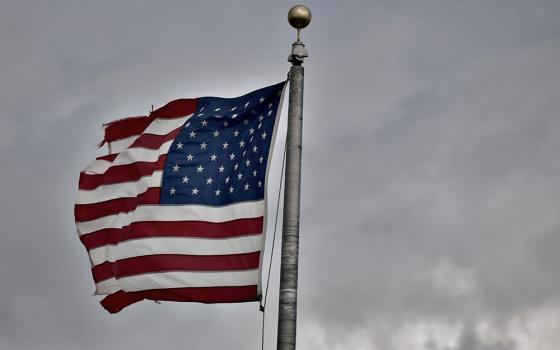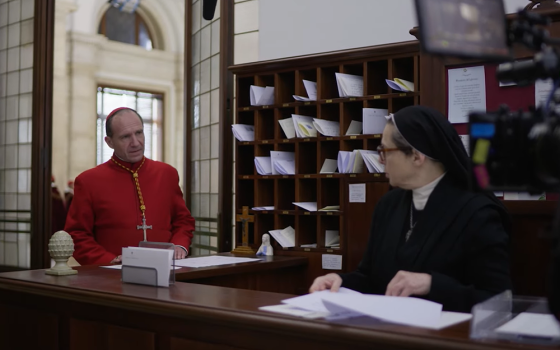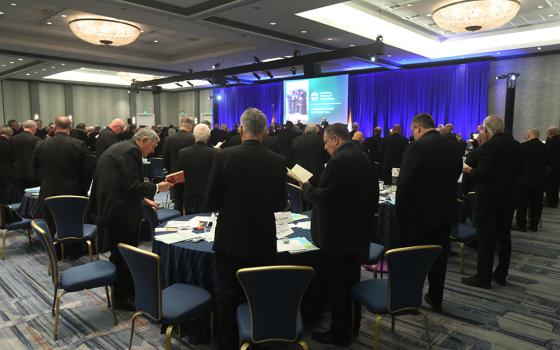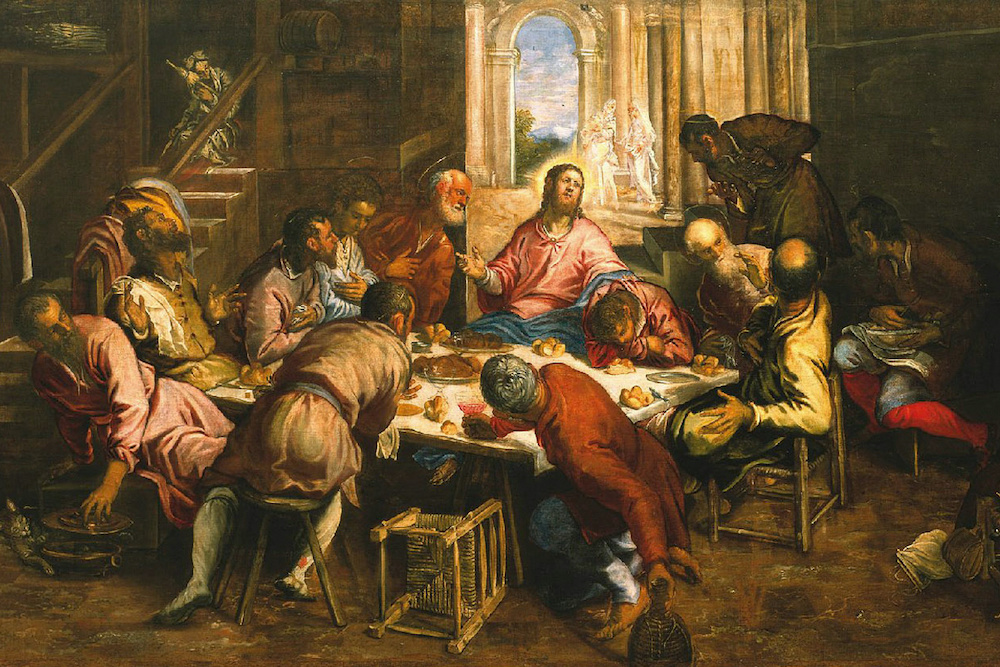
Detail of Tintoretto's "The Last Supper," 1592-94 (CNS/Courtesy of the Holy See Pavilion Press Office)
A conservative friend criticized NCR's series last week in which we asked a couple dozen prominent Catholics what they thought the church would look like after coronavirus. He objected that very few people even mentioned the name of Jesus Christ. In some circles, there is an awkwardness about bringing the Lord's name into the conversation, and I think that inhibition limits our ability to evangelize, but in this case, something different was at work. Most conversations at a place like NCR start at 20 miles per hour; that is to say, you are allowed to assume certain facts. When you spend time with a group of people who build houses, they all know that without a solid foundation, nothing else matters, but they do not spend a lot of time talking about the foundation. They talk about some new window design or a particular carpentry method.
"Besides," I thought to myself, "next week is the Triduum." By this, I mean that these three days (which my friend and NCR board member Dan Schutte, in introducing his series on the Triduum, points out is really one continuous prayer spread over three days, not three distinct days of prayer) bring us back to the facticity of our faith. The paschal mystery transcends history by entering into history. Those who seek to reduce the Christian faith to an ethical or political program, those who conceive of the church as a non-governmental organization with incense and choirs, anyone who disparages religion as the opiate of the people or the projection of our psychological needs, all here meet their match in the testimony of the early church and the New Testament witness: Jesus Christ suffered, died and was buried, and on the third day he was raised from the dead.
Everything else we believe or do as Christians rises or falls with the claims made from the beginning about the historical facts we commemorate — and more than commemorate — in these days. As one friend said to me, "The sacramental economy is a gift that Christ entrusted to the apostles and their successors for the church and through which the entire paschal mystery continues to be present." We enter into the great mystery of salvation; we do not simply remember it. An example of entering into the mystery is found in one of my favorite parts of the Holy Thursday liturgy, when the priest in the eucharistic prayer begins the words of consecration saying, "On the night he was betrayed, that is tonight …" In the midst of these great mysteries, human time is conquered.
On Holy Thursday, we especially celebrate the institution of the Eucharist, the institution of the priesthood and the command to love, all first given at the Last Supper.
Advertisement
This year, of course, we Catholics really miss the Eucharist. We really miss our priests. Some of my liberal friends are floating ideas about a revamped ecclesiology that might emerge from this crisis. Some of the entries in that series on the coronavirus betrayed a "Brave New Church" sensibility. I discern in these that uniquely modern curse, solipsism, which is one of the things that stands opposite what we mean by the word "Catholic." You don't "experiment" with Holy Week liturgies, which include some of the most ancient prayers we know, precisely because the Catholic people of God have always most resisted change when the occasion is most solemn. God so loved the world he did not send a theology faculty. The people of God want their church back and their Masses back, not some newfangled church or some faux Mass.
Any pastor worth his salt knows that in a time of crisis, the human heart reaches for what it knows and treasures. So far from reaching for any modernism in the midst of this crisis, Pope Francis last week stood amidst the baroque splendor of St. Peter's, holding a monstrance containing the consecrated host, the eucharistic Lord, blessing the people and dispensing indulgences. He will not be experimenting with the liturgies of Holy Week.
If we feel the deprivation of the Eucharist and the priesthood profoundly in this pandemic, all of us have experienced the command to love one another, symbolized by the washing of the feet or mandatum rite, in ways we never have had before. The hands of our nurses and doctors and those who clean our hospitals are the hands of Jesus washing the feet of those whose lives hang in the balance. Those of us who are serious about staying at home so as to do our part and not make things worse for those front-line workers, we are, as it were, washing their feet with our obedience to the common good. Dr. Tony Fauci, not for the first time, has placed his enormous bureaucratic skill and medical knowledge at the service of the most vulnerable in our midst. He is washing America's feet every day.
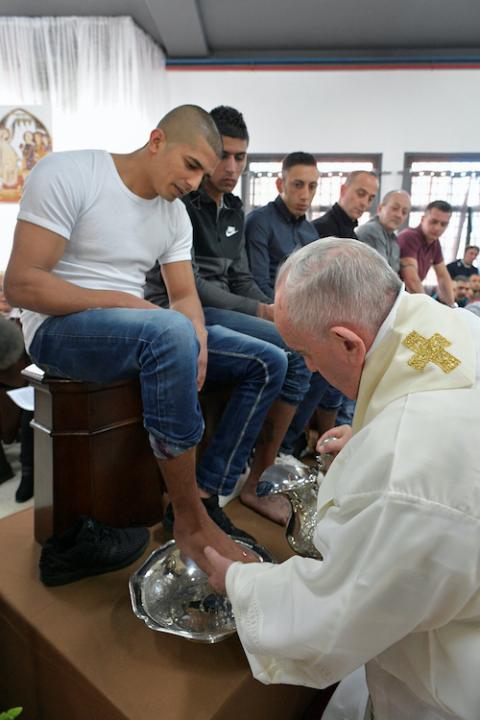
Pope Francis washes the feet of an inmate during a Holy Thursday celebration at Velletri Correctional Facility in Italy April 18, 2019. (CNS/Reuters/Vatican Media)
It is strange. Of all the commands of Jesus, the command to "do this in memory of me" has been the one we Christians have most obeyed. Since the very beginning of the church, Christians gather on the Lord's day to celebrate the Eucharist. The command to love one another as he loved us? That is the one we are still working on. Perhaps this painful separation from our obedience to the first command will help us all to focus on how we can better obey the second. The secret is the opposite of solipsism. The secret is getting out of the way. As one of my great mentors, the atheist philosopher Paul Weiss, once explained, if you believe in a God who is all powerful and all good, then all prayer is a variation of one prayer: Thy will be done. And, as we are the only creatures who can consciously choose to obstruct the divine will, the better part of discipleship is getting out of the way. Or, as St. Paul wrote in the letter to which we listened on Palm Sunday, the key to imitating Christ is self-emptying, not self-assertion, still less self-promotion.
I am not a particularly spiritual person. I am easily distracted, even at Mass. I do not read spiritual classics. I would rather stick pins in my eyes than make a retreat. But, in these days, I weep. Sometimes, it is a scriptural passage, sometimes a word or phrase from the preacher. Usually, however, it is when we sing one of the hymns that I have known all my life and evokes something deep, very deep, in the soul. My voice breaks. I struggle to hold back the tears. The reality of Jesus' suffering, death and resurrection is too powerful for my normal, emotionally aloof posture.
On Holy Thursday, the hymn that always brings me to tears is "Lord, Who At Thy First Eucharist." In the third verse, I always think of my friends and family who have drifted away from the church, as we sing:
We pray thee, too, for wand'rers from thy fold;
O bring them back, Good Shepherd of the sheep,
Back to the faith which saints believed of old,
Back to the Church which still that faith doth keep.
I especially like that it is always the Lord who is the protagonist in these verses: Here, we call upon him to bring the wandered back to the fold. When I look back at the times I have wandered from the fold, I can see clearly that it was grace that brought me back. A temptation of our modern era is to think that it is we who are the protagonists. We become forgetful about grace. We slip into Pelagianism, so suited to this protean age in which we live. The Triduum instructs us differently.
I do not know when I first encountered the fourth verse of this hymn. In the little church where I grew up, we rarely did more than two verses of a hymn. (Even on Trinity Sunday, which was awkward because the Holy Spirit always got left out of "O God, Almighty Father.") But at some point before my mother died, I must have been playing the organ and using a different hymnal from mine when I discovered these beautiful words in the hymn's fourth verse:
So, Lord, at length when sacraments shall cease,
May we be one with all thy Church above,
One with thy saints in one unbroken peace,
One with thy saints in one unbounded love.
We sang that fourth verse at my mother's funeral and later at my father's funeral. I have asked that it be sung at mine as well. I hope that if you sing these words in your heart on Holy Thursday, you do not omit this fourth verse which points us, as the Triduum leads us, beyond the horizon of this vale of tears. Here is the hymn being sung at the Basilica of the Sacred Heart on the campus of the University of Notre Dame:
[Michael Sean Winters covers the nexus of religion and politics for NCR.]
Editor's note: Don't miss out on Michael Sean Winters' latest. Sign up and we'll let you know when he publishes new Distinctly Catholic columns.

